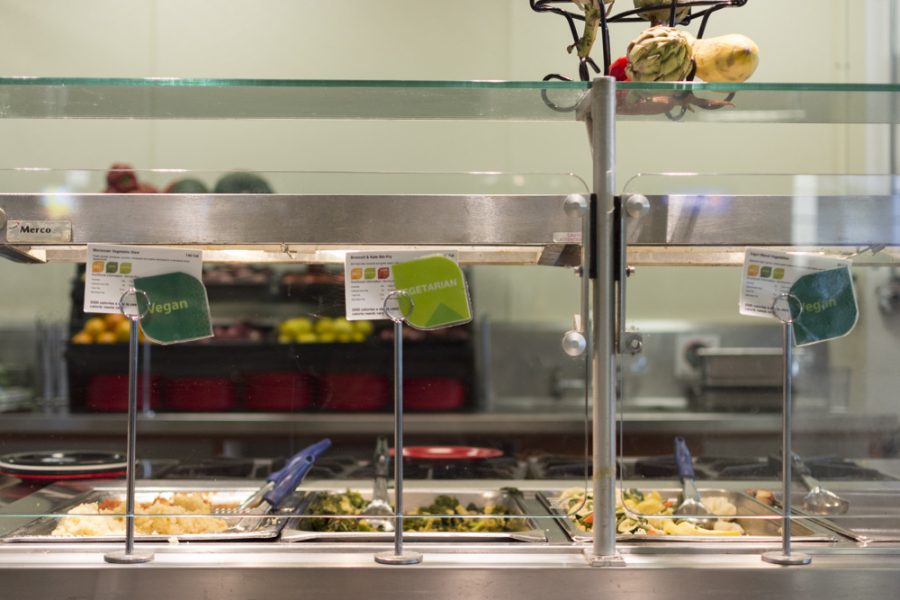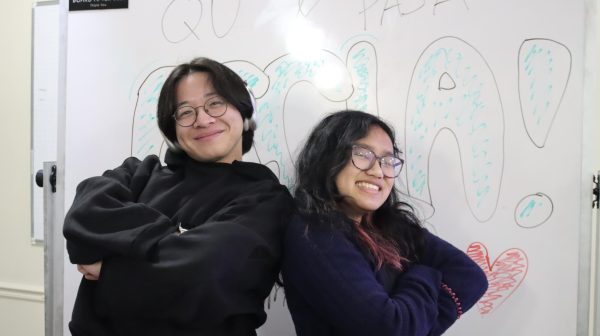CSUEB Aramark contract set until 2018
Photo by Tam Duong Jr./The Pioneer
Aramark provides a select number of hot and ready foods for student and staff in the Dining Commons at the CSUEB Hayward Campus in June.
Cal State East Bay’s campus food options have always been a relevant topic of discussion on campus. Whether criticism has been directed towards the lack of healthy food choices provided in the dining commons and on-campus restaurants, the arguably high prices at the POD market and bookstore or simply the limited variety of restaurants available on campus, discontent has long been expressed.
The university dining program contract is set to end in just over two years and questions regarding the future of Cal State East Bay’s dining services are bubbling to the surface: What does the current contract with Aramark entail, when will this contract expire, what will happen when that time arrives and how will this affect which restaurants are brought to campus or how food prices are determined?
Aramark is a corporation that provides food service, facilities and uniform services to hospitals, universities, school districts, stadiums and other businesses around the world.
According to Robert Todaro, the director of Procurement Services, CSUEB’s current contract with Aramark was signed in July of 2009 and extends until June 30, 2018. It was the first contract CSUEB ever signed with this corporation.
In the current contract, Cal State East Bay and Aramark agreed that Aramark would manage the university’s dining service program for students, faculty and staff. This includes the dining commons and restaurants like Panda Express, Subway and Pizza Hut, and also the food trucks that are available on campus a few days per week.
From July 2009 to July 2012, the contract was overseen by the CSUEB Foundation, which is a non-profit auxiliary organization within the California State University system. But as of July 2012, the university took over the contract and assumed all of the liabilities and obligations from the foundation, Todaro stated.
Although there is no language in the current contract that offers the option to extend it beyond its end date, Todaro explained that the university’s intent is to complete that contract. Subsequently, they will prepare a new proposal, which is essentially an invitation for bids on behalf of companies that provide food services and includes the terms and conditions on how that service is to be operated. This proposal is expected to be completed approximately one year before the contract with Aramark expires.
“It takes at least 90 days to get a proposal package put together with housing on the requirements that are going to be under the contract and we receive proposals like after two weeks,” Todaro stated.
Anyone that provides food services can apply, including Aramark, and it typically takes 30 to 60 days before a decision will be made on the awardee.
This decision is based on technical, business and price factors.
“Technical factors are things such as how long those companies that are proposing have been in business, what they are bringing to the table from a technical standpoint, which would be the food they serve and what they are recognized in the industry for,” Todaro stated.
From a business standpoint, the university looks for references from other companies or institutions that the proposing companies have previously been or are currently providing food services to, to become familiarized with each company’s services.
Price-wise, the university arranges the basis for the services that will be provided, which ultimately refers to the revenue percentage that the university will take and what percentage Aramark will keep.
According to Todaro, under the current contract, Cal State East Bay gets about 10 percent back from the total revenue.
All of the food and menu items and prices were mutually agreed upon by the two parties, including the food service locations that would be brought to campus and the hours of operation for each location.
Todaro explained that the contract specified that Aramark would be required to publish and maintain a dining commons menu online, which was to include the nutritional and ingredient information for all food being offered.
Additionally, the contract requires that they comply with the federal and state food quality standards for their frozen foods, dairy products, fresh produce and meats, among others.
Aramark additionally agreed to provide special diet menus and nutritional programs including vegetarian and vegan options, while also making sure that a portion of the daily menu in the dining commons consists of identified low-fat, low-sodium and low-cholesterol entrees.
The university’s Housing Department is the designated department responsible for overseeing and ensuring that that all of the terms and conditions that the university and Aramark agreed upon are being met.
Todaro explained that under the current contract there is no clear indication as to whether students’ feedback and input is taken into consideration when a contract is being negotiated and food options are being decided.
However, the university recently sent out an email with a food access survey, which is believed to be the only method of feedback and communication between the university and students.












